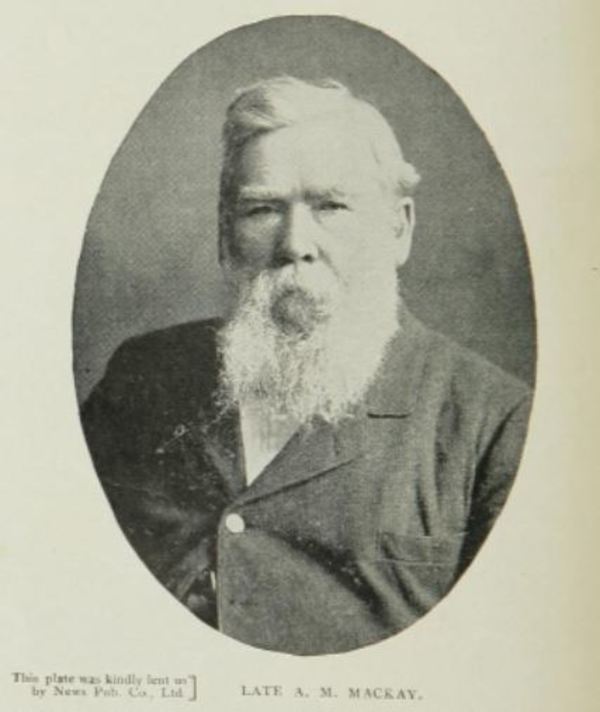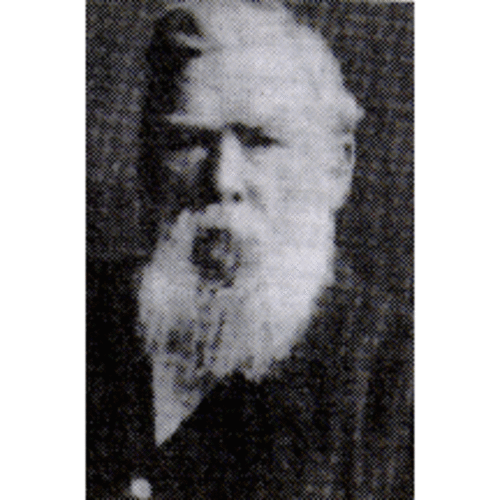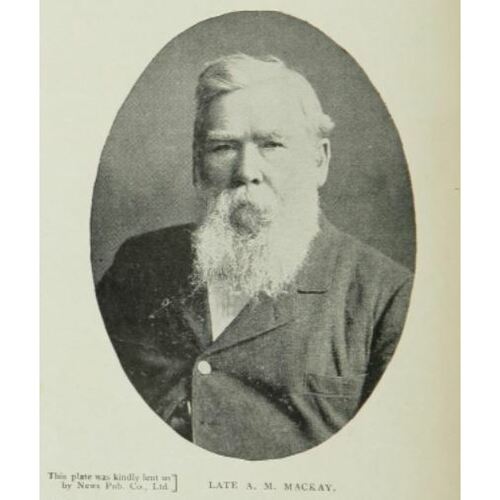As part of the funding agreement between the Dictionary of Canadian Biography and the Canadian Museum of History, we invite readers to take part in a short survey.

Source: Link
MACKAY, ALEXANDER McLELLAN, businessman and politician; b. 1834 in Pictou County, N.S.; m. 18 Oct. 1859 Elizabeth O’Neill in Pictou, and they had five daughters, one of whom died in infancy, and four sons; d. 24 Nov. 1905 in St John’s.
After teaching briefly, Alexander Mackay worked as a telegrapher in Halifax, Hamilton, Upper Canada, and New York. He went to Newfoundland in January 1857 as local superintendent of the New York, Newfoundland and London Telegraph Company (which was to be amalgamated with the Anglo-American Telegraph Company in 1873), whose operations consisted of a line across the island and a link with Cape Breton [see Frederic Newton Gisborne*]. The company was then in the third year of a 50-year monopoly on the use of this line and a connecting line across the Avalon peninsula to St John’s. Mackay found a broken-down system and a dispirited work crew. He had the line rebuilt, and following the laying of a transatlantic cable to Heart’s Content in 1866, it would become a valuable asset in Anglo-American’s operations.
He was responsible in 1885 for establishing at St John’s the first public telephone system in Newfoundland. Two years earlier he had successfully blocked the Bell Telephone Company of Canada from obtaining a franchise on the island by threatening to discontinue operating government telegraph lines, which he had managed since 1877. Mackay also asserted that a telephone service fell under Anglo-American’s telegraph franchise and threatened Bell with court action if necessary to enforce his company’s monopoly. Also in 1885 he helped merchant Moses Monroe* to establish the St John’s Electric Light Company.
Mackay had become active in the social and cultural life of St John’s. A leading mason, he was a provincial grand master from 1867 until his death. In 1877, as a member of St Andrew’s Church (Presbyterian), he helped promote a union of that congregation and the Free Church [see Moses Harvey]. He was a founder of the mercantile City Club in October 1883 and served as its president until 1905.
Mackay had entered politics in 1878 as a supporter of William Vallance Whiteway and his railroad policy. He was elected by acclamation in Burgeo and LaPoile and served in Whiteway’s cabinet as minister without portfolio from 1882 to 1884. He was one of several politicians who left the Whiteway party the next year in the aftermath of a violent confrontation between Protestants and Roman Catholics in Harbour Grace. In the general election that followed the premier’s resignation, Mackay was returned as a supporter of Robert Thorburn, again by acclamation. When Whiteway re-entered politics in 1889, Mackay did not stand, and he was appointed to the Legislative Council on 24 December. Whiteway also named him to the Newfoundland Fisheries Commission (chaired by Augustus William Harvey) and to a governorship of the Newfoundland Savings’ Bank.
In 1892 the public telegraph system was the subject of an inquiry headed by Colonial Secretary Robert Bond*. Sixteen years earlier the government had decided to build lines from St John’s to various parts of the island, and Anglo-American had erected the lines under contract with the government paying the cost. The company was to maintain the public lines and be compensated for any operating deficits. In April 1891 the government had accepted Mackay’s offer to manage the public lines personally for one year for $18,000 and the following May appointed him general superintendent of the system. He remained in charge of the lines belonging to Anglo-American.
At the 1892 inquiry Mackay claimed that he had personally contracted to build the government lines of the 1870s and others in the late 1880s, which he managed for a commission levied without authorization. The inquiry found that government accounts were intertwined with those of Anglo-American and Mackay’s personal bank account. It concluded that he had misappropriated public funds and falsified vouchers and receipts. In March 1893 the government published the findings of the commission and removed Mackay from management of the public telegraph. Further action against him was checked by political events in the colony. After the Tories came to power in April 1894 following their successful challenge to the Liberal victory the previous year [see Whiteway], Colonial Secretary Alfred Bishop Morine* reviewed the inquiry’s report and dismissed it as a “grossly partisan and disgraceful document.” He told Mackay the government planned a review of both the subject of the inquiry and the manner in which it had been conducted. However, the collapse of the banks in December [see James Goodfellow*; A. W. Harvey] brought the Liberals back into office, and the new government was preoccupied with the colony’s financial predicament.
Mackay had backed the Tories, led by Monroe and Walter Baine Grieve, in the 1893 election. Late that year the Liberal Evening Telegram asserted that Mackay had used the telegraph system free during the campaign in support of the Tory party, and that the Liberals had had to “adopt a private code in order to avoid publicity.” He sued the newspaper for libel, and in June 1894 Sir James Spearman Winter* of the Supreme Court found in his favour, awarding him $600 and costs.
In May 1896 Governor Sir Herbert Harley Murray, determined to improve the image of the Legislative Council after several of its members had been charged with conspiracy and larceny following the collapse of the banks, forced Mackay to resign from the council. He returned to active politics four years later, when he successfully contested Port de Grave on behalf of the Conservatives. They, however, were defeated by the incumbent Liberals under Robert Bond. Mackay was re-elected in 1904; his was one of only two districts to return Conservative candidates.
With its monopoly about to expire in 1904, the Anglo-American Telegraph Company again came under serious attack early in the new century. When in 1901 Guglielmo Marconi sent the first wireless telegraph message from England to St John’s, the company threatened court action if Marconi were to establish a transatlantic terminal in Newfoundland. Mackay was unable to secure an extension of his company’s monopoly in 1904. The Bond government had legislation passed giving the Newfoundland post office control of all telegraphic services but allowing it to enter into arrangements with Anglo-American. It was Bond’s intention to take over the company’s lines, but negotiations broke down in May. The government then built a second line on the Avalon peninsula connecting St John’s with the other public lines and reduced rates internally by 60 per cent. In so doing, Bond managed to break the company’s monopoly. Although he had hoped to reduce the rates for foreign messages as well, Anglo-American was in fact allowed to continue the more lucrative non-Newfoundland business.
Mackay had suffered a jaundice attack in May 1904, and his health never fully recovered. His career had revolved around Anglo-American, whose interests he had protected vigorously. For such devoted service, directors of the company F. N. Gisborne, Cyrus West Field, and Peter Cooper had once given him a “handsome cabinet of silver.”
[In addition to the sources cited below, the author consulted an unpublished paper, “The political career of Robert Bond,” prepared by James K. Hiller of the Memorial Univ. of Nfld, St John’s, for a forthcoming collection of historical essays on 20th-century Newfoundland being edited by Dr Hiller and Peter F. Neary. m.b.]
PANS, RG 32, 162, 17 Oct. 1859. PRO, CO 194/234, Murray to Chamberlain, 22 Jan. 1896, esp. enclosure no.6, Morine to Mackay, 2 June 1894; CO 199/86 (Nfld, Blue book, 1890; copy at PANL). Daily News (St John’s), 25, 27 Nov. 1905. Evening Herald (St John’s), 12 March 1890, 25 June 1894, 24 Nov. 1905. Evening Telegram (St John’s), 21, 24 Nov. 1893. Presbyterian Witness, 22 Oct. 1859. The book of Newfoundland, ed. J. R. Smallwood et al. (6v., St John’s, 1937–75), 1: 329. I. L. Dickinson et al., “A history of telecommunications in Newfoundland, 1849–1949” (paper prepared for Engineering 6101, Memorial Univ. of Nfld, 1979), app.G. Encyclopedia of Nfld (Smallwood et al.), 1: 692–707. Hiller, “Hist. of Nfld.” Nfld, House of Assembly, Journal, 1893, app.: 105–6, 397, 510–18. Nfld Quarterly, 5 (1905–6), no.3: 18–19 (obit. by Daniel Woodley Prowse*). D. W. Prowse, Hist. of Nfld (1895), 641.
Cite This Article
Melvin Baker, “MACKAY, ALEXANDER McLELLAN,” in Dictionary of Canadian Biography, vol. 13, University of Toronto/Université Laval, 2003–, accessed March 31, 2025, https://www.biographi.ca/en/bio/mackay_alexander_mclellan_13E.html.
The citation above shows the format for footnotes and endnotes according to the Chicago manual of style (16th edition). Information to be used in other citation formats:
| Permalink: | https://www.biographi.ca/en/bio/mackay_alexander_mclellan_13E.html |
| Author of Article: | Melvin Baker |
| Title of Article: | MACKAY, ALEXANDER McLELLAN |
| Publication Name: | Dictionary of Canadian Biography, vol. 13 |
| Publisher: | University of Toronto/Université Laval |
| Year of revision: | 1994 |
| Access Date: | March 31, 2025 |




